Little Red Schoolhouse may refer to:

The Unitarian Church is a historic American church on Exeter Road in Hampton Falls, New Hampshire. Built in 1838, it is a rare example of an in antes Greek Revival temple front in the state, and is distinguished by the presence of Victorian trompe-l'œil panels and ribbing on its interior walls. The church was listed on the National Register of Historic Places in 1984. It is presently used for services in the summertime.
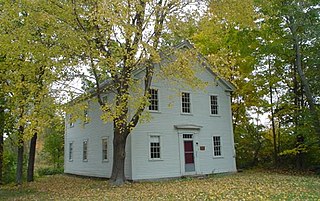
The Square Schoolhouse is a historic schoolhouse at the junction of New Hampshire Route 156 and Ledge Hill Road in Nottingham, New Hampshire. Built about 1850, it is one of the best-preserved mid-19th century schoolhouses in southern New Hampshire. It served as a school until 1920, and is now a local museum. It was listed on the National Register of Historic Places in 1980. It is named not for its shape, but for its location in Nottingham Square.

The Indian Stream Schoolhouse is a historic school building on Tabor Road in Pittsburg, New Hampshire. Built in 1897, it is one of the town's few surviving 19th-century district schoolhouses. It was listed on the U.S. National Register of Historic Places in 2011, and the New Hampshire State Register of Historic Places in 2007. It presently serves as a local history museum, open for tours by appointment.

The East Andover Village Center Historic District encompasses the historic village center of East Andover, New Hampshire, United States. The 2.2-acre (0.89 ha) district includes a cemetery and three buildings: the Andover Congregational Church, the Highland Lake Grange Hall, and the East Andover Schoolhouse. It is located at the corner of New Hampshire Route 11 and Chase Hill Road. The district is unified by the appearance of the three buildings, and their styling, which is predominantly vernacular 19th century.

The High Tops School, also known as Schoolhouse No. 9, is a historic school building at the corner of Reynolds and River roads in Westmoreland, New Hampshire. Built in 1789 and remodeled in 1846, it is one of a small number of district schoolhouses in the region to survive demolition or adaptation to residential use. The building was listed on the National Register of Historic Places in 1984, and the New Hampshire State Register of Historic Places in 2007. It is now owned by the Westmoreland Park Hill Meeting House and Historical Society.

The Richmond Public Library is the public library of Richmond, New Hampshire, United States. It is located in the Richmond School House No. 6 at 19 Winchester Road in the village center. Built in 1850, the building is the best-preserved of the town's few surviving district schoolhouses. It was listed on the National Register of Historic Places in 1980.
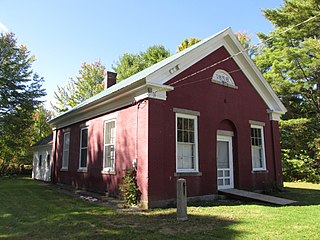
The District No. 2 Schoolhouse, also known as the Little Red Schoolhouse, is a historic one-room schoolhouse at 2851 Wakefield Road in Wakefield, New Hampshire. Built in 1858–59, it was at the time one of the finest district schoolhouses in rural New Hampshire. It was used as a school until 1941, and now houses the museum of the local historical society. The building was listed on the National Register of Historic Places in 1980.

The Madison School, District No. 1 is a historic one-room district schoolhouse, located on the grounds of the Madison Elementary School on New Hampshire Route 113 in Madison, New Hampshire. The school was built in 1835, and continues to exhibit Greek Revival characteristics despite alterations in 1873 and 1951. It was used as a school until 1950, has hosted town meetings, and has served as the local library. It is presently home to the local historical society. The building was listed on the National Register of Historic Places in 1980, and the New Hampshire State Register of Historic Places in 2006.
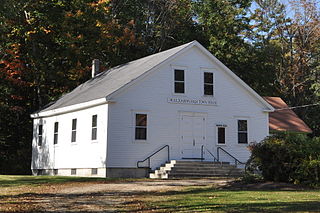
The Moultonborough Town House is the former town hall of Moultonborough, New Hampshire. It is located on New Hampshire Route 25 in Moultonborough's main village, and is now home to the local historical society. It was built in 1834, and is one of the oldest town hall buildings in Carroll County. It was listed on the National Register of Historic Places in 1989, and the New Hampshire State Register of Historic Places in 2004.

The North Weare Schoolhouse is a historic school building on Old Concord State Road in northern Weare, New Hampshire. Built about 1856, it is a stylistically distinctive vernacular mixing of Federal, Greek Revival, and Italianate styling. It is the most architecturally distinctive of Weare's surviving 19th-century schoolhouses. It was used as a public school until 1952, and then served as a grange hall until the 1980s. The building was listed on the National Register of Historic Places in 1995.

The Gen. John Stark House is a historic house museum at 2000 Elm Street in Manchester, New Hampshire. The house, a single-story Cape style farmhouse, was built in 1736 by Archibald Stark. Stark's son John, a hero of the American Revolutionary War, lived in this house from 1736 to 1765; it is where he brought his new bride Molly, and where two of their children were born. It was listed on the National Register of Historic Places in 1973. It is now operated as a museum by the local chapter of the Daughters of the American Revolution.

The Giffin House is a historic house on New Hampshire Route 10 in Goshen, New Hampshire. Built in 1835, it served as a schoolhouse until 1957, and is one of three surviving 19th century schoolhouses in Goshen. It is also part of a cluster of plank-frame houses built in the community. The house was listed on the National Register of Historic Places in 1985.

The Isaac Reed House is a historic house at 30-34 Main Street in downtown Newport, New Hampshire. Built about 1869, it is a good local example of Second Empire architecture, and an important visual element of the surrounding commercial downtown and civic area. The house was listed on the National Register of Historic Places in 1985, and is a contributing property to the Newport Downtown Historic District.

The Old Sullivan County Courthouse was the first county courthouse of Sullivan County, New Hampshire. Construction of the brick building in 1825-26 was instrumental in securing Newport's status as the shire town of the county when it was established in 1827. The building was listed on the National Register of Historic Places in 1985. The building is now in commercial use.

The District No. 9 Schoolhouse is a historic school building at 358 Hoyt Road in Gilford, New Hampshire. Built in 1815 and repeatedly altered to accommodated changing trends in school design, it is the best-preserved of Gilford's surviving district schoolhouses. Now a private summer residence, the building was listed on the National Register of Historic Places in 2000.
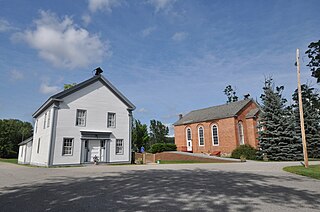
The School House and Town Hall is a historic municipal building on Schoolhouse Road, just west of United States Route 7 in the center of Leicester, Vermont. Built about 1858, it is a fine example of late Greek Revival architecture, and is the town's best-preserved district schoolhouse. Its upper floor has served as the town hall since its construction. It was listed on the National Register of Historic Places in 1988.

The West Berkshire School is a historic school building at Berkshire Center and Mineral Brook Roads in Berkshire, Vermont. Built about 1820, it is one of the state's oldest surviving two-room two-story schoolhouses. It was used as a school until 1970. It was listed on the National Register of Historic Places in 1993.
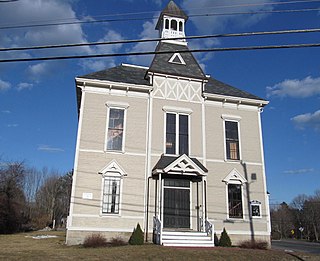
Centennial Hall is a historic community hall and schoolhouse at 105 Post Road in North Hampton, New Hampshire. Built in 1876, it is a distinctive local example of Stick Style architecture, and has served the town as a schoolhouse and community meeting place for most of its existence. It was listed on the National Register of Historic Places in 1980.

The District No. 5 Schoolhouse is a historic district school building at 32 Pleasant Valley Road in Underhill, Vermont. Built in 1861, it served the town as a school until it was damaged by fire in 1951, but remains a community landmark. It is now owned by the local historical society. It was listed on the National Register of Historic Places in 2018.






















